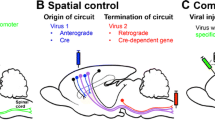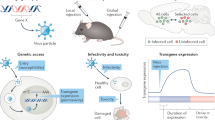Abstract
Neural transmission is a communication between neurons and target cells, resulting in behavioral and physiological changes. Defective or altered neural transmission is thought to occur in neuropsychiatric and neurodegenerative illnesses. To probe the biological consequences of defective or altered neural transmission, various genetically engineered transgenic mouse models have been developed, together with conventional pharmacological manipulation. Via genetic manipulation, we are able to engineer specific neurotransmitters, receptors, inactivation of neurotransmitters or neural innervation density. Moreover, recently developed molecular genetic techniques make it possible to induce either a gene knock out event or transgene expression at a discrete time point in a specific neuronal population in both embryos and adult animals. In conjunction with pharmacological manipulation, these sophisticated genetic manipulations of neural transmission will provide new tools to control neural transmission in both normal and pathophysiological conditions.
Similar content being viewed by others
Author information
Authors and Affiliations
Rights and permissions
About this article
Cite this article
Son, J., Joh, T. Genetically engineered neural transmission. Mol Psychiatry 2, 26–31 (1997). https://doi.org/10.1038/sj.mp.4000181
Received:
Accepted:
Issue Date:
DOI: https://doi.org/10.1038/sj.mp.4000181
- Springer Nature Limited




